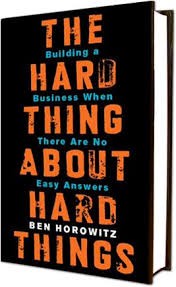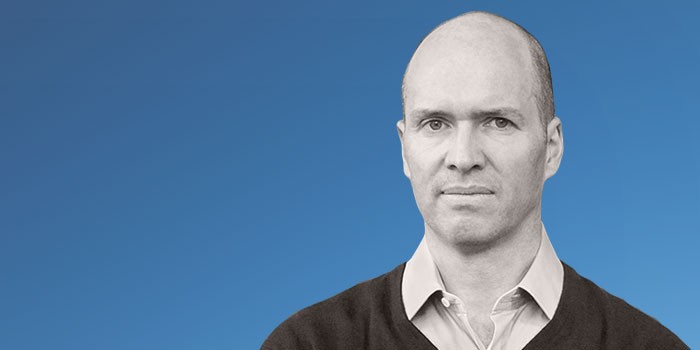The Hard Thing About Hard Things

You know I’m lagging a lot on reading when I start reviewing the old classics. The Hard Things about Hard Things is the one absolute must-read for any startup founder. I read it as soon as it came out back in March 2014 — mainly because I’ve been a long-time ardent fan of Ben Horowitz/Marc Andreessen/a16z.
A very quick note about Ben first. He founded LoudCloud in 1999 with Marc Andreessen. The company rode the boom wave of the time, but unsurprisingly ran into troubles when the bubble burst. Eventually, LoudCloud sold its hosting business to EDS, and renamed itself to Opsware in 2003. It became one of the first companies to offer Software as a Service and to attempt cloud hosting, and eventually sold to Hewlett-Packard for $1.6 billion in 2007. Soon after, Marc and Ben started Andreessen Horowitz, also known as a16z. It is one of the most successful VC firms in the Silicon Valley — Facebook, Foursquare, GitHub, Pinterest and Twitter are all part of its portfolio!
Here are some of the top things I learned from this book:
- Treat your employees fairly and always tell them the truth. CEOs should Tell It Like It Is and ensure informal information and ideas are flowing freely in your company, instead of adopting the old management standard: “Don’t bring me a problem without bringing me a solution.” What if the employee cannot solve an important problem?
- Figuring out the right product is the innovator’s job, not the customer’s. After the first line of code is written, decisions are no longer objective in the technology business.
- Startup CEOs should not play the odds. When you are building a company, you must believe there is an answer and you cannot pay attention to your odds of finding it. You just have to find it. It matters not whether your chances are nine in ten or one in a thousand; your task is the same.
- You will have to lay people off at some point. Hence, get your head right by focusing on the future of the company rather than the past. Be clear about why you need to lay people off. If it is because the company failed to hit its plan, then admit that failure.
If you’re going to eat shit**, don’t nibble.**
- It is crucial to create a good work environment. This doesn’t matter as much when things go well, but it can be the difference between life and death of the startup when things go wrong. Take care of the people, the products, and the profits — in that order.
- Hire for strength rather than lack of weakness. Have clear expectations of who you are hiring with a realization that there is something seriously wrong with every employee in your company (including you). Nobody is perfect.
- Involve multiple people in brainstorming but make the final decision solo. Consensus-based decisions tend to sway the process away from strength and towards weakness.
- As a company grows, it is important to minimize politics within your organization. Hire people with the right kind of ambition. Maintain strict policies and processes on organizational design, performance evaluations, promotions, and compensation.
- Every CEO of a startup should focus on what needs to be right rather than worrying about what is wrong. One of the most difficult challenges is keeping your mind in check. You need to be able to move aggressively and decisively without acting insane.
What sets this book apart from every other management book? This quote from the book itself nails it:
“Every time I read a management or self-help book, I find myself saying, “That’s fine, but that wasn’t really the hard thing about the situation.”
The hard thing isn’t setting a big, hairy, audacious goal. The hard thing is laying people off when you miss the big goal.
The hard thing isn’t hiring great people. The hard thing is when those “great people” develop a sense of entitlement and start demanding unreasonable things.
The hard thing isn’t setting up an organizational chart. The hard thing is getting people to communicate within the organization that you just designed.
The hard thing isn’t dreaming big. The hard thing is waking up in the middle of the night in a cold sweat when the dream turns into a nightmare.”
Again, this book is a must-read for any startup founder. This review does no justice to the blunt, straight-shooting writing style that will really drill down some of the best advice you can get from one of the veterans of the valley. I’ll end this review with a quote that I think sums up what life as a startup founder is like:
Marc: Do you know the best thing about startups?
Ben: What?
Marc: You only ever experience two emotions: euphoria and terror. And I find that lack of sleep enhances them both.
This is #34 in a series of book reviews published weekly on this site.
